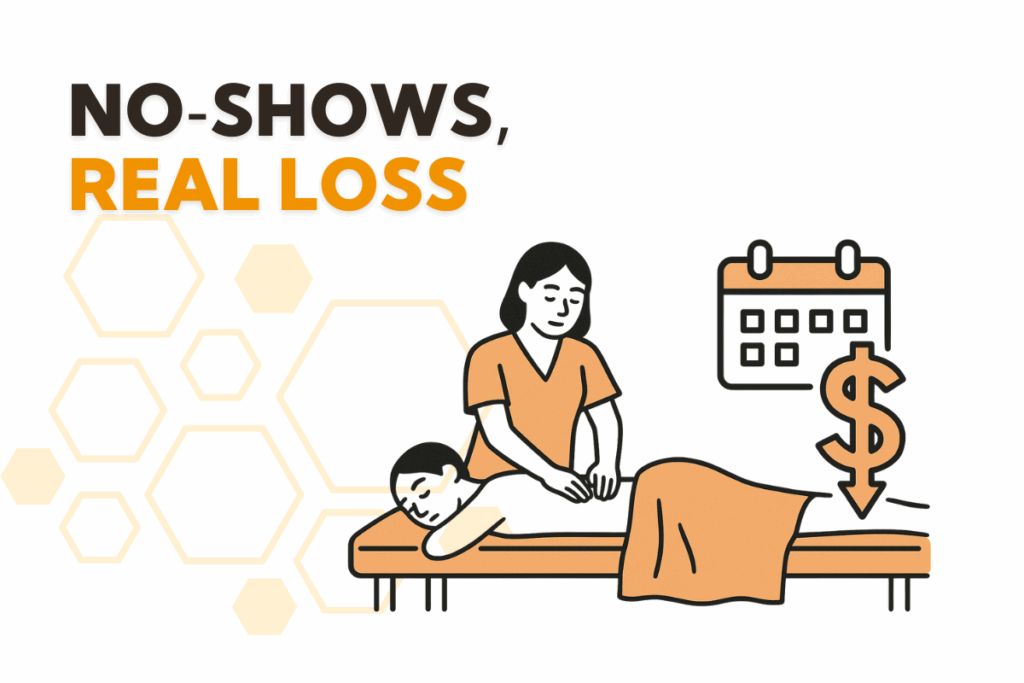Last-minute cancellations are one of the most frustrating and costly problems for massage therapists and clinic owners.
Cancellations Aren’t Just Annoying-They’re Disrupting Your Entire Business
You prep the room. You check the intake form. You maybe even turn away another client to save that slot. Then comes the text: “Sorry, I can’t make it.”
These last-minute cancellations pile up quickly, and over time they can cost thousands in lost income. But it’s not just the money. It’s the unpredictability that erodes your trust in your schedule and your sense of control as a business owner.
Let’s break down why this keeps happening, what you can do about it, and how to put better systems in place without losing the human touch.
Why Clients Cancel at the Last Minute (and What You Can Learn From It)
Life Happens-But So Does Avoidance
From forgetfulness to unexpected emergencies, people often cancel for understandable reasons. But some clients cancel simply because they don’t feel a strong commitment to the appointment. Without clear expectations in place, they may assume it’s no big deal.
The Hidden Trend: Clients Don’t Know the Cost
In a recent survey, nearly 41% of clients didn’t realize a therapist lost income when they cancelled last minute. For them, it’s a calendar adjustment. For you, it’s a break in your business rhythm.
Know Your Cancellation Rate and Why It Matters
Understanding how often last-minute cancellations happen can help you decide where to make changes. You can calculate your cancellation rate by dividing the number of cancellations under 24 hours by your total number of booked appointments. Do the same for your no-show rate. Multiply each by 100 to get a percentage.
Tracking this data can reveal patterns. Maybe cancellations spike on weekends or with certain clients. Knowing your numbers is the first step toward making changes.
You can simplify this process using tools like automated tracking. Try using a system like automated reporting for cancellation tracking in Hivemanager’s reporting and analytics.

How to Build a Strong Cancellation Policy
A solid cancellation policy should protect your time without damaging client relationships. It needs to be clear, visible, and enforced. Most clinics go with a 24-hour window. That means clients who cancel within 24 hours could be charged 50%, and no-shows are charged 100%.
Make sure your policy is easy to find. Include it in intake forms and confirmation emails. Then, most importantly, stick to it. Clients will respect what you consistently enforce.
Example Policy
Appointments cancelled with less than 24 hours’ notice will be charged 50% of the session fee. No-shows will be charged the full amount.
This makes the policy clear and professional, without being harsh.
Protect the Booking: Deposits and Cards on File
Getting a deposit or card on file creates a level of commitment before the appointment. This simple step increases the likelihood that your client will show up. And if they don’t, you can follow through on your cancellation policy.
There are a few ways to do this. You can require a credit card to reserve the appointment, ask for a partial prepayment, or request a deposit for high-risk time slots like evenings or weekends.
This works best when it’s integrated into your booking flow. Use a system that supports online appointment scheduling with card-on-file capability like Hivemanager’s online payments.
Improve Show Rates With Smarter Reminders
Don’t just remind clients of their appointment-reinforce your policy too. A well-written reminder can reduce last-minute cancellations by keeping your expectations top-of-mind.
Send a sequence of reminders:
At 72 hours out, check in gently. At 24 hours out, mention your cancellation policy. At 2 hours out, give a final heads-up.
Here’s an example message: “Looking forward to your session tomorrow. Remember that cancellations within 24 hours may be subject to a fee.”
This tone is friendly but firm, and it helps your policy stick.
Filling the Gaps With a Waitlist and Booking Strategy
Even the best clients cancel sometimes. A waitlist helps you fill those empty slots quickly. Let clients opt in when they book, then message your list as soon as you have an opening.
You can also adjust your booking strategy. Schedule clients who tend to cancel later in the day, and leave a few flexible blocks in case you need to move others around.
These small changes can go a long way in protecting your income and keeping your day flowing.
How to Reconnect After a Cancellation
If a client cancels or no-shows, reach out. Don’t ignore it, but don’t shame them either. A simple, kind message keeps the door open.
Try this: “Hey Alex, I noticed you missed your appointment yesterday. I hope everything’s okay. Just a heads-up that our policy applies, and I’m happy to help you find a new time.”
This shows care and reinforces that your time matters.

What Other Therapists Are Doing
Inside the Hivecommunity, many therapists say it took time to feel confident enforcing policies. But the turning point usually came when they realized their policies protect not just their income-but also their energy and the clients who value them.
One therapist said, “I used to feel guilty enforcing my policy, but then I realized, it’s how I protect the clients who do show up.”
Clear policies, consistent boundaries, and friendly reminders are what make your business more sustainable.
Actions You Can Take Today
Start by reviewing your past 30 days of cancellations. Identify patterns and track your rates. If you don’t already have one, draft a clear cancellation policy and add it to your intake forms.
Set up a system to collect deposits or save cards on file. Update your reminder messages to include a short version of your policy. And try starting a waitlist, even if it’s informal at first.
Every step helps reduce last-minute cancellations and bring more consistency to your schedule.
When You Respect Your Time, Clients Learn to Respect It Too
Last-minute cancellations are a common struggle, but they don’t have to derail your business. Put the right systems in place, set expectations clearly, and take action on patterns as they emerge.
With support from others in the Hivecommunity, you can protect your time, reduce last-minute cancellations, and create more ease in your workday.
Frequently Asked Questions
Most clinics enforce a 24-hour policy, meaning clients must cancel or reschedule at least one full day in advance to avoid a charge. This provides a fair balance of flexibility and predictability.
Many therapists do, especially if the client didn’t call or message at all. Charging 100% for a no-show and 50% for late cancellations is a common practice. Just be sure to state this clearly in your policy.
Build compassion into your policy. You might waive the fee for first-time emergencies but note that it’s a one-time courtesy. The goal is to be fair, not rigid.
Be honest and kind. Let them know you value their business but need to protect your time. Reiterate the policy and encourage booking when they can commit. Boundaries build trust, not resentment.


